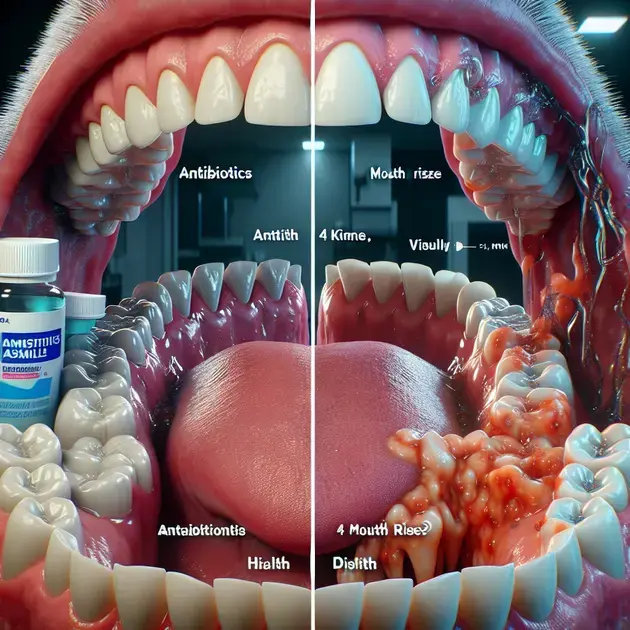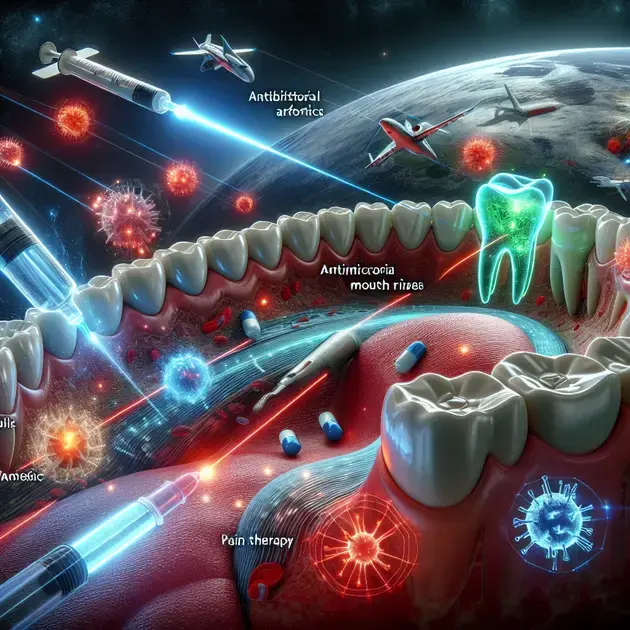When it comes to treating periodontitis, finding an effective medication is crucial for managing this common but serious condition. In this comprehensive guide, we will explore the latest and most reliable medications available for combating periodontitis and restoring oral health.
Periodontitis is a chronic inflammatory disease that affects the gums and bone supporting the teeth. If left untreated, it can lead to tooth loss and other serious health complications. That’s why staying informed about the most effective medications is key to successful periodontitis management.

Effective Treatment Options for Periodontitis
Periodontitis is a serious gum infection that damages the soft tissue and destroys the bone that supports your teeth. It can lead to tooth loss if not properly treated. Here are some effective treatment options for periodontitis:
1. Professional Dental Cleaning:
Schedule regular dental cleanings with a periodontist who specializes in treating gum disease. They will remove plaque and tartar buildup from your teeth and gums using specialized tools and techniques.
2. Scaling and Root Planing:
This deep cleaning procedure involves scraping off tartar from above and below the gum line, as well as smoothing out rough spots on the tooth root where bacteria accumulate. It helps the gums reattach to the teeth and prevents further infection.
3. Antibiotic Treatment:
Your dentist may prescribe antibiotics to help control bacterial infection and reduce inflammation in the gums. Antibiotics can be taken orally or applied directly to the affected areas.
4. Surgical Treatments:
In severe cases of periodontitis, surgical intervention may be necessary. Procedures like flap surgery, bone grafts, and tissue regeneration can help restore damaged tissues and improve gum health.
5. Laser Therapy:
Laser treatment can target and remove diseased tissue while promoting the regeneration of healthy gum tissue. It is less invasive than traditional surgery and offers faster healing times.
Top Medications for Managing Periodontitis
Medications can play a key role in managing periodontitis by controlling bacterial growth, reducing inflammation, and promoting healing. Here are some top medications commonly used for managing periodontitis:
1. Chlorhexidine Mouthwash:
Chlorhexidine mouthwash is a common prescription rinse that helps reduce plaque buildup and control bacteria in the mouth. It can be purchased at most pharmacies or prescribed by your dentist.
2. Antibiotic Gels:
Topical antibiotic gels containing medications like minocycline or doxycycline can be applied directly to the gums to target and eliminate bacteria causing gum disease. These gels are usually prescribed by your dentist.
3. Systemic Antibiotics:
In cases of severe periodontitis, your dentist may prescribe systemic antibiotics like amoxicillin or metronidazole to combat bacterial infection throughout the body. It is important to follow the prescribed dosage and duration.
4. Pain Medications:
To manage pain and discomfort associated with periodontitis, over-the-counter medications like ibuprofen or acetaminophen can be used. Your dentist may recommend specific pain relief options based on your individual needs.
5. Anti-Inflammatory Drugs:
Anti-inflammatory medications like corticosteroids can help reduce swelling and inflammation in the gums. These medications may be prescribed in the form of mouth rinses or gels for localized treatment.
Key Factors to Consider When Choosing a Medication
When selecting a medication for treating periodontitis, several factors should be taken into consideration to ensure effective and safe treatment. Here are key factors to consider when choosing a medication:
1. Severity of the Condition:
The severity of your periodontitis will determine the type and dosage of medication needed. Consult with your dentist to determine the most suitable treatment plan for your condition.
2. Allergies and Sensitivities:
Inform your dentist about any allergies or sensitivities you may have to medications to avoid potential adverse reactions. They can recommend alternative medications that are safe for you to use.
3. Interaction with Other Medications:
If you are currently taking any other medications or supplements, discuss potential interactions with your dentist before starting a new medication for periodontitis. Certain medications may interfere with each other’s effectiveness.
4. Cost and Accessibility:
Consider the cost and accessibility of the medication prescribed for periodontitis. Check if your insurance covers the medication or explore generic alternatives to manage expenses.
5. Treatment Duration and Compliance:
Understand the required duration of treatment and ensure your ability to comply with the prescribed medication regimen. Consistent use of the medication as directed by your dentist is crucial for successful management of periodontitis.

Top Medications for Managing Periodontitis
Periodontitis is a serious gum infection that can lead to tooth loss if left untreated. Fortunately, there are several medications available to help manage the symptoms of periodontitis and prevent further progression of the disease. Here are some of the top medications commonly used for managing periodontitis:
1. Chlorhexidine Mouthwash
Chlorhexidine mouthwash is a common prescription medication used to help control plaque and gingivitis, which are precursors to periodontitis. This antimicrobial mouthwash works by killing bacteria in the mouth and reducing inflammation in the gums. It is often recommended for use after dental procedures to help prevent infection and promote healing.
When choosing a chlorhexidine mouthwash, it is important to follow the instructions provided by your dentist or healthcare provider. This medication should be used as directed and for the recommended duration to achieve the desired results. Some potential side effects of chlorhexidine mouthwash include staining of the teeth and temporary alteration of taste perception.
2. Antibiotics
Antibiotics may be prescribed by your dentist or periodontist to help control bacterial infections associated with periodontitis. These medications are usually recommended for short-term use and may be prescribed in pill form or as a topical gel that is applied directly to the gums.
It is important to take antibiotics exactly as prescribed and to finish the full course of treatment, even if symptoms improve before the medication is gone. Failure to complete the prescribed course of antibiotics can lead to antibiotic resistance and a recurrence of the infection.
3. Nonsteroidal Anti-Inflammatory Drugs (NSAIDs)
NSAIDs, such as ibuprofen or naproxen, may be recommended to help reduce pain and inflammation associated with periodontitis. These over-the-counter medications can help manage discomfort and swelling in the gums, making it easier to perform daily oral hygiene tasks and follow recommended treatment regimens.
Before taking NSAIDs for periodontitis, it is important to consult with your healthcare provider to ensure they are safe for you to use. These medications may interact with other drugs or medical conditions, so it is important to disclose your full medical history and current medication list to your healthcare provider.
Key Factors to Consider When Choosing a Medication
When choosing a medication to manage periodontitis, there are several key factors to consider to ensure you are selecting the most appropriate treatment for your individual needs. These factors include:
1. Severity of the Disease
The severity of your periodontitis will play a significant role in determining the most appropriate medication for your condition. Mild cases of periodontitis may only require over-the-counter mouthwashes or NSAIDs, while more severe cases may necessitate prescription medications such as antibiotics or antimicrobial gels.
Your dentist or healthcare provider will assess the severity of your periodontitis and recommend the most appropriate treatment based on their evaluation.
2. Potential Side Effects
Before starting a new medication for periodontitis, it is important to be aware of the potential side effects associated with the medication. Some medications may cause adverse reactions in certain individuals, such as allergic reactions, staining of the teeth, or gastrointestinal upset.
Discuss any concerns or questions about potential side effects with your healthcare provider before starting a new medication.
3. Cost and Accessibility
Cost and accessibility are also important factors to consider when choosing a medication for periodontitis. Some medications may be more expensive or difficult to obtain than others, depending on your insurance coverage and location.
Work with your healthcare provider to find a medication that fits your budget and is readily available to you.
4. Adherence to Treatment Plan
Adherence to your treatment plan is essential for successfully managing periodontitis. Choose a medication that you feel comfortable using and can commit to taking as prescribed. Missing doses or not following the recommended regimen can hinder the effectiveness of the medication and compromise your treatment outcomes.
Discuss any challenges or concerns you have about adhering to your treatment plan with your healthcare provider to find solutions that work for you.
The Role of Antibiotics and Antimicrobial Mouth Rinses
Antibiotics and antimicrobial mouth rinses play a crucial role in the management of periodontitis by targeting and eliminating harmful bacteria in the mouth. These medications help reduce inflammation, prevent infection, and support the healing process in the gums.
1. Antibiotics
Antibiotics are prescribed to control bacterial infections that contribute to the progression of periodontitis. These medications work systemically to target bacteria throughout the body, including those present in the gums and oral cavity. By eliminating harmful bacteria, antibiotics help reduce inflammation and promote tissue healing in the gums.
It is important to take antibiotics exactly as prescribed by your healthcare provider to ensure their effectiveness and minimize the risk of antibiotic resistance. Follow the recommended dosing schedule and finish the full course of treatment as directed.
2. Antimicrobial Mouth Rinses
Antimicrobial mouth rinses, such as chlorhexidine mouthwash, are commonly recommended for use in conjunction with regular oral hygiene practices to help control plaque and gingivitis. These mouth rinses work by killing bacteria in the mouth and reducing inflammation in the gums, helping to prevent the progression of periodontitis.
When using antimicrobial mouth rinses, it is important to follow the instructions provided by your dentist or healthcare provider. Use the mouthwash as directed and for the recommended duration to achieve the desired results. Regular use of antimicrobial mouth rinses can help maintain oral health and prevent complications associated with periodontitis.
Conclusion
Managing periodontitis requires a strategic approach that involves a combination of medications tailored to individual needs. Chlorhexidine mouthwash, an antimicrobial powerhouse, effectively controls plaque and gingivitis, safeguarding against the onset of periodontitis. Its proper usage under professional guidance can help prevent infections and promote oral healing, albeit with potential side effects like tooth staining and taste alterations.
Antibiotics, vital for combatting bacterial infections linked to periodontitis, are essential when prescribed correctly. Ensuring strict adherence to the recommended dosages and completing the full treatment course is crucial to prevent antibiotic resistance and recurrence of infections. Additionally, NSAIDs offer relief from pain and inflammation, enabling better oral hygiene practices and treatment compliance.
When selecting a medication, key factors such as disease severity, potential side effects, cost, and accessibility play pivotal roles. The severity of periodontitis dictates the type of medication needed, ranging from over-the-counter options to prescription-based interventions. Awareness of potential side effects and open communication with healthcare providers are essential in making informed decisions regarding treatment plans for effective periodontitis management.
Antibiotics and antimicrobial mouth rinses are instrumental in combating harmful bacteria, reducing inflammation, and supporting gum healing. Antibiotics target systemic bacterial infections, aiding in tissue recovery and inflammation reduction within the oral cavity. Complementing oral hygiene routines with antimicrobial mouth rinses like chlorhexidine enhances plaque and gingivitis control, preventing periodontitis progression when used as directed over time.



